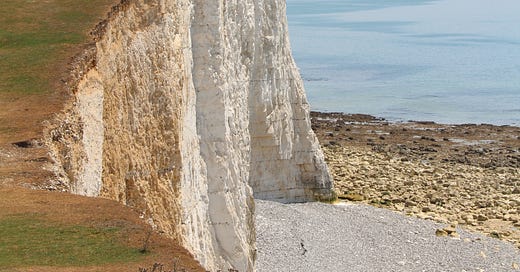Passage:
They sailed on to the country of the Gerasenes, directly opposite Galilee. As he stepped out onto land, a madman from town met him; he was a victim of demons. He hadn't worn clothes for a long time, nor lived at home; he lived in the cemetery. When he saw Jesus he screamed, fell before him, and bellowed, "What business do you have messing with me? You're Jesus, Son of the High God, but don't give me a hard time!" (The man said this because Jesus had started to order the unclean spirit out of him.) Time after time the demon threw the man into convulsions. He had been placed under constant guard and tied with chains and shackles, but crazed and driven wild by the demon, he would shatter the bonds.
Jesus asked him, "What is your name?"
"Mob. My name is Mob," he said, because many demons afflicted him. And they begged Jesus desperately not to order them to the bottomless pit.
A large herd of pigs was browsing and rooting on a nearby hill. The demons begged Jesus to order them into the pigs. He gave the order. It was even worse for the pigs than for the man. Crazed, they stampeded over a cliff into the lake and drowned.
Those tending the pigs, scared to death, bolted and told their story in town and country. People went out to see what had happened. They came to Jesus and found the man from whom the demons had been sent, sitting there at Jesus' feet, wearing decent clothes and making sense. It was a holy moment, and for a short time they were more reverent than curious. Then those who had seen it happen told how the demoniac had been saved.
Later, a great many people from the Gerasene countryside got together and asked Jesus to leave—too much change, too fast, and they were scared. So Jesus got back in the boat and set off. The man whom he had delivered from the demons asked to go with him, but he sent him back, saying, "Go home and tell everything God did in you." So he went back and preached all over town everything Jesus had done in him.
One of the things that I have been pretty intentional about over the last couple of years is trying to read and hear voices from outside my tribe. This has been helpful to expand my thinking and help me to ask different questions as I come to the Scriptures.
I remember in seminary I took a class on missions and the professor had served in a country on the continent of Africa. He had been teaching pastors there about practical theology. At the end of the course his students were frustrated about the content of the class. He asked why. They responded with wanting to know why issues regarding polygamy, black magic, and exorcisms were not covered in the class. You see, the professor was teaching from his perspective and answering questions that his students were not asking. In future sections of the course he adjusted what he taught for his context.
Recently, I was listening to a podcast with a woman who is disabled and is doing work in the area of theology. As a result, she comes to the Scripture with a different lens than I do as someone who is able bodied. In that interview she talked about how we need to consider the healing actions of Jesus as redemptive acts of bringing the person back into the community as a fully participating member.
As I listened to her talk about this it was one of those record scratch moments where I was left dumbfounded by not realizing this sooner.
Reading this passage this morning it struck me at how blatantly obvious the redemptive work of Jesus here is in bringing this man back into community. He was exiled and imprisoned in the cemetery. After Jesus drove out the demons he was in his right mind and clothed. He desperately wanted to go with Jesus.
What Jesus response?
It was to send him back to his town and let everyone know. Jesus intentionally sent him back to his community.
Reconciliation is a huge part of redemption. The work that Jesus is doing is bringing people back into community with one another. Yes body, mind, and soul are healed, yet practically speaking, the healing ministry of Jesus allowed people to return to being participating members of the community. The barriers were removed and the way opened.
So, this has me thinking. How can we participate in doing the same? How can we be agents of healing in the world by removing barriers from the participation of those around us? What kinds of steps can we take to invite others in?
I am wrestling with this. What about you? I’d love your thoughts and ideas in the comments!





